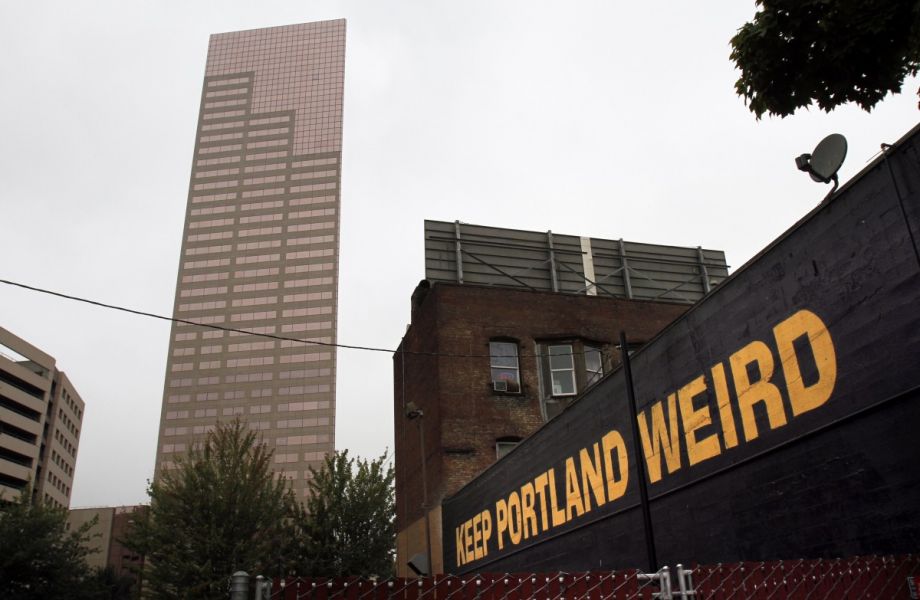Airbnb is hardly known for its cozy relationship with city governments. The room-renting company has come to symbolize the “sharing economy” and tends to operate in the gray (if not black) areas of municipal law. But as the company faces fines and subpoenas in Barcelona and New York, officials in Portland want to legalize it, spurring a tangled public debate and muddying alliances across the spectrum of housing advocacy.
In early June, the Portland City Council considered an ordinance that would sanction and tax short-term rentals like those facilitated by the San Francisco startup. Since then, the council has broadened its scope from single-family to multi-family homes, considering whether city law should permit apartment tenants and condo owners to rent their spaces through Airbnb. A verdict is expected on July 23rd.
Public response has been mixed, with supporters and opponents voicing a common theme: The rent is (already) too damn high. For some affordable housing advocates the concern is that short-term “hotels” going for as much as $100 a night will crowd out long-term tenants and — with demand outpacing supply — rents will spike. Meanwhile, hours of public comment from Airbnb users around Portland play on a similar argument; property taxes and rent are increasing, so residents desperate to stay in their homes have turned to side-cash from Airbnb.
Deborah Imse is the executive director of Multifamily NW, a trade organization that represents about 170,000 units of market-rate and low-income housing in Oregon. She fears Portland could become like another city known for its housing woes.
“San Francisco has serious concerns about this situation depleting the availability of affordable housing,” she said at a City Council meeting July 2nd. “People are taking their units off the market and just doing short-term rentals.”
Other speakers at the same meeting exemplified how this could happen. Cynthia Braun, a longtime landlord, said she could make “three to four times as much money” doing Airbnb as she could with a long-term rental. But those testifying in favor of legalization used the flipside of Imse’s logic, describing situations in which they couldn’t pay rents or mortgages and had, themselves, nearly lost homes. Several people described living on fixed incomes as property taxes rose, renting out rooms to make ends meet. Gary Cash said he’d given up his job after his partner died and nearly had to move, but Airbnb had given him “a second chance at life.”
A common thread at that meeting was the fact that more than 15,000 rentals are already offered in Portland through Airbnb. Why not regulate and tax activity that is already going on?
A similar argument is being made by another group of advocates. Israel Bayer is the executive director of Street Roots, a newspaper and non-profit for Portland’s homeless population. Bayer’s organization wants taxes from legalized short-term rentals like Airbnb to fund more affordable housing, particularly at the very-low income level.
“We feel like the horse is already out of the stable,” he says. “This being a housing issue, why not use the money generated to invest in housing?”
Others are skeptical.
“If you’re putting money to a program to support affordable housing, but that program is actually depleting the affordable housing supply, that’s kind of a head-scratcher,” Imse says.
But while supporters of affordable housing disagree, the council’s proposal has united groups that tend — at least in other cities — to fall into opposite camps. Along with housing advocates, landlords and neighborhood groups have also voiced concern.
“This kind of hybrid hotel concept is not meant for multi-family housing,” says Maureen McNabb of Capital Property Management, a company that oversees 145 buildings of market-rate housing in Portland.
For one thing, McNabb says, short-term rentals violate the lease of any building that doesn’t allow subletting. Landlords would have no say over who was coming and going; lease contracts require criminal checks, but if a renter auctioned out their space — becoming a kind of mini-landlord — no such document would protect the building’s other renters.
City officials say that no municipal change would trump a lease agreement; to obtain a permit from the city, renters would need a landlord signature.
Adding another wrinkle to the debate, Portland’s mayor Charlie Hales has a history of support from the housing sector. During the July 2nd meeting, he cited involvement with the Multifamily NW council and the fact that he, too, had been a landlord to argue for legalization. Willamette Week published a story on July 9th pointing out that real estate interests were among the most generous to Hales’ mayoral campaign.
“The mayor’s willingness to give Airbnb what it wants has irked his political base,” the article states, adding that Airbnb has been in contact with city hall throughout 2014 through both a lobbying firm and meetings described in at least one email — obtained by a public records request — as “mano a mano.” The paper also reports that Hales’ daughter is dating the company’s chief mapmaker.
Airbnb just began collecting regional hotel taxes. McNabb calls the new funds a “pittance of what the city needs,” adding, “it’s a very desperate move on their part.”
But according to hours of testimony by Airbnb users, home-sharing has actually been the move of desperation. City hall comments reflect a narrative beloved by Silicon Valley — one where traditional safety nets have failed.
Only time will tell if the problem of spiking rents is worsened by their solution.
The Equity Factor is made possible with the support of the Surdna Foundation.

Rachel Dovey is an award-winning freelance writer and former USC Annenberg fellow living at the northern tip of California’s Bay Area. She writes about infrastructure, water and climate change and has been published by Bust, Wired, Paste, SF Weekly, the East Bay Express and the North Bay Bohemian
Follow Rachel .(JavaScript must be enabled to view this email address)

















